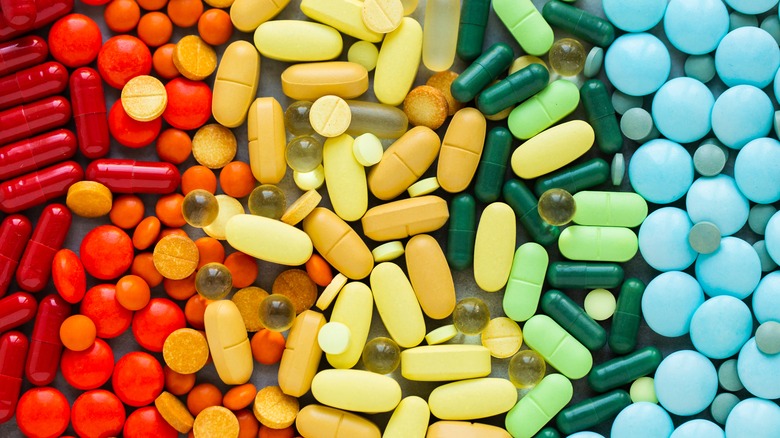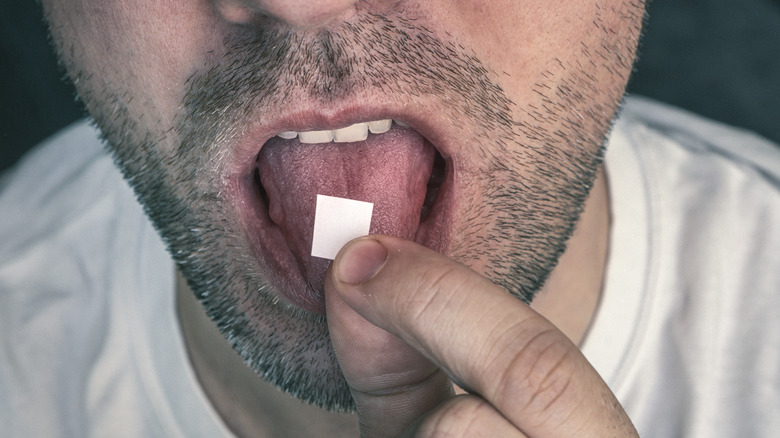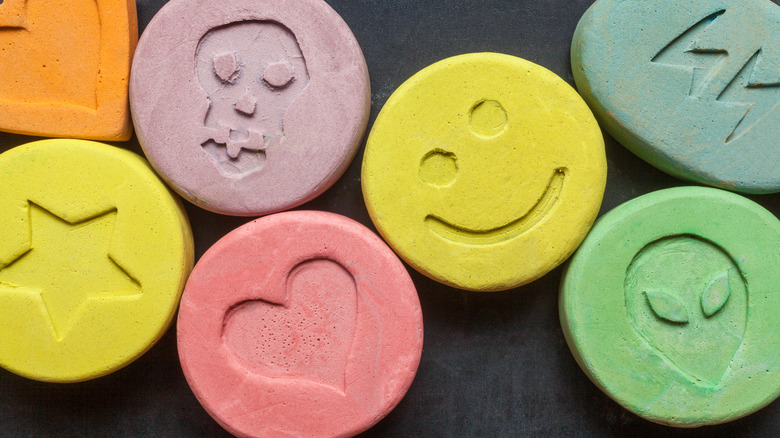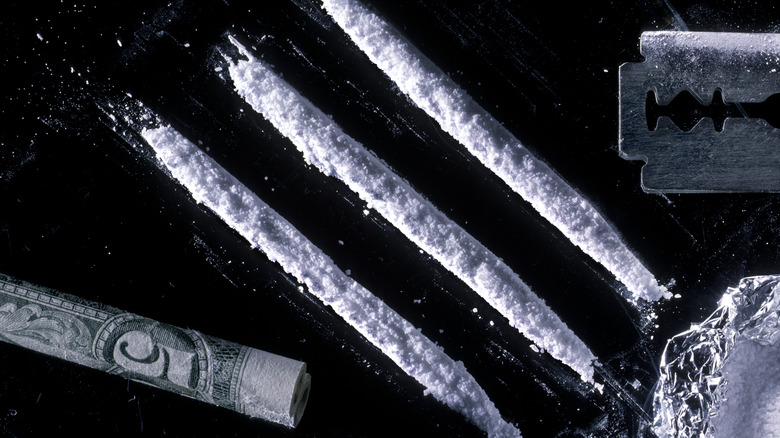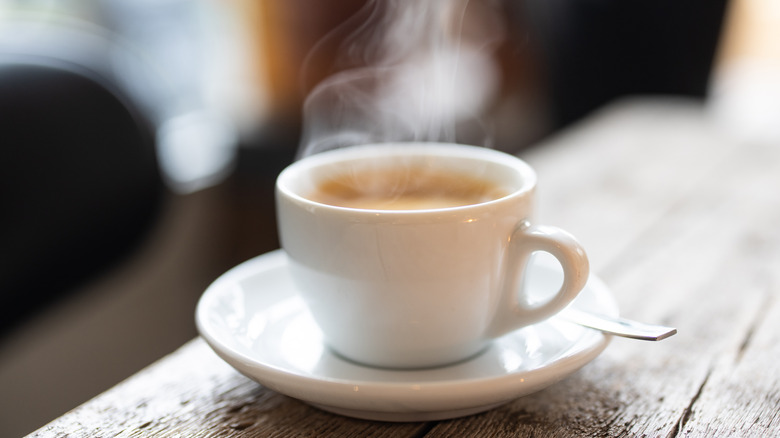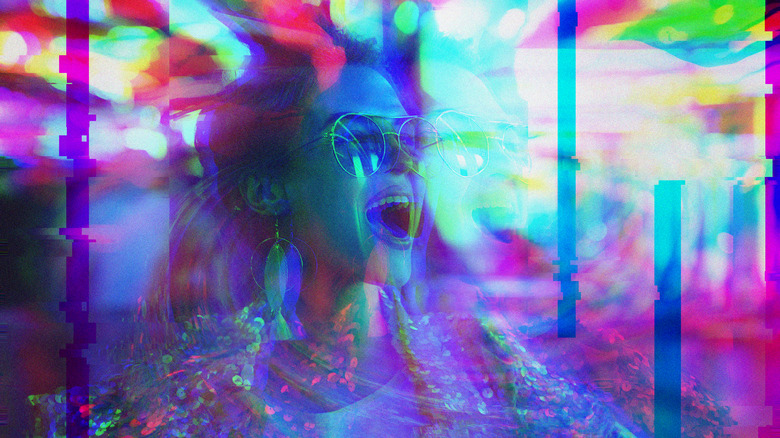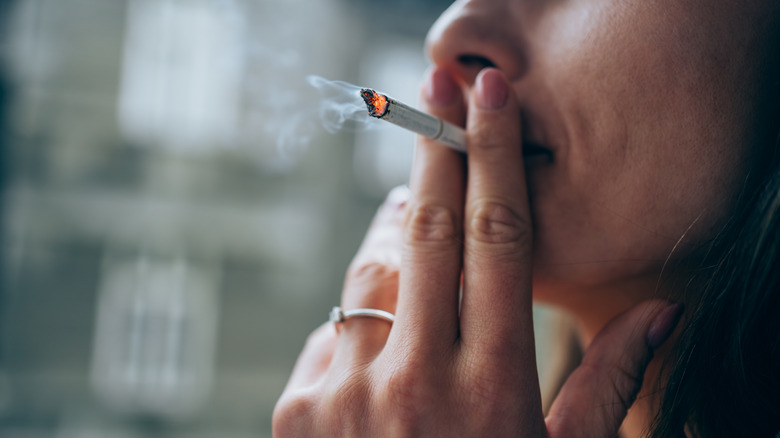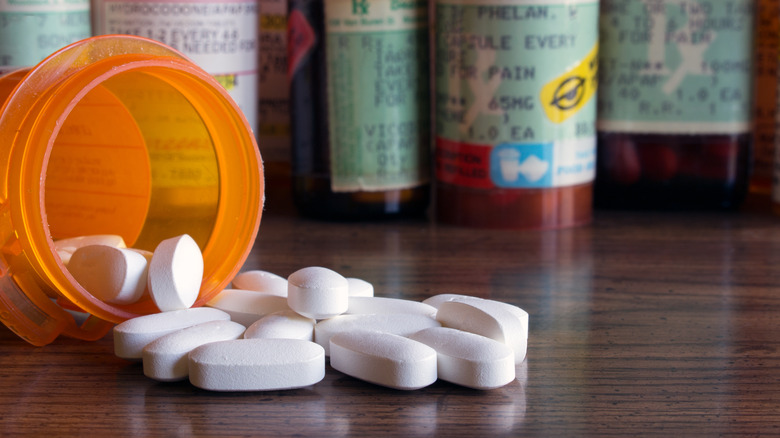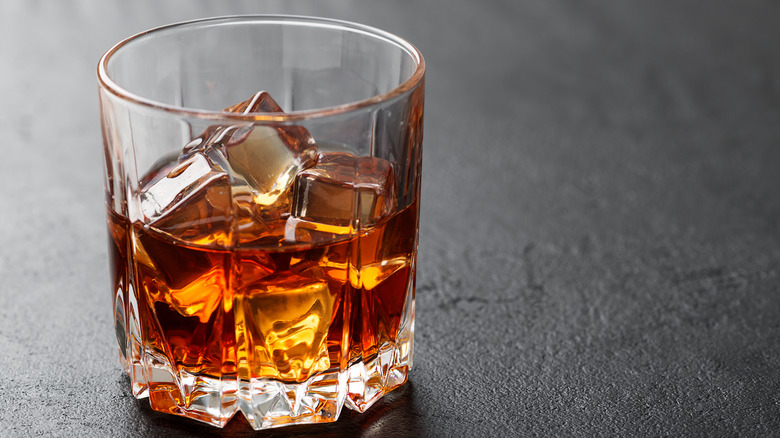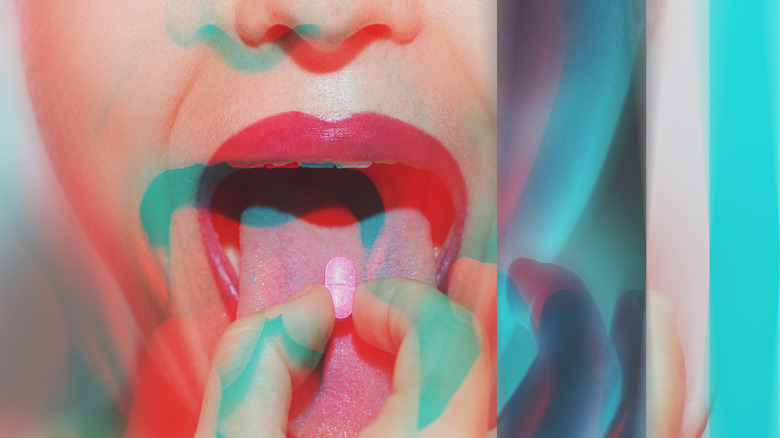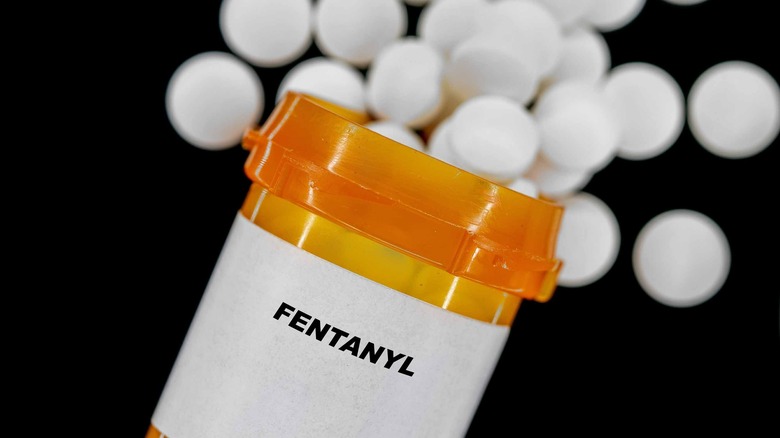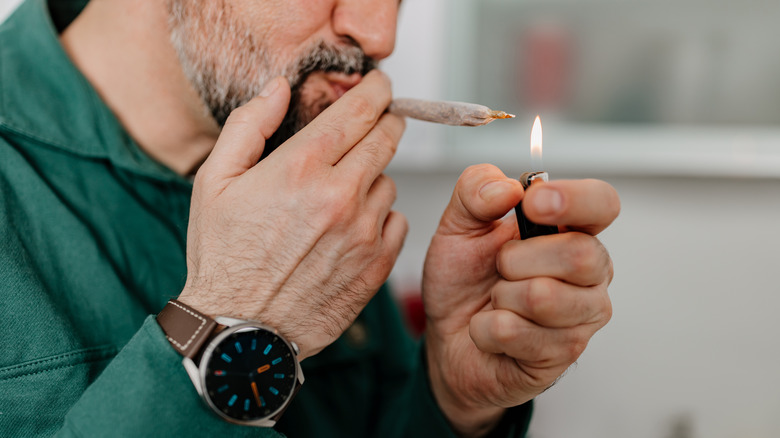False Facts About Drugs You Always Thought Were True
Ever since human beings crawled out of the primordial ooze, they have been searching for substances to alter their physical, mental, or emotional state; to perk them up, to relieve pain, to help them have a good time, or to ... well, to return their brains to the primordial ooze. People have used mind-altering substances for pretty much as long as there have been people – archaeologists have found evidence of psychotropic plants being used by early, pre-homosapien hominids. For that matter, it's easy to forget that it's only been within the last century that drug use has been not just lightly frowned upon but criminalized; your great-grandparents may have relieved pain with a nice, relaxing dose of heroin or enjoyed a cocaine-laden soft drink as a pick-me-up before those substances became illegal.
Before the advent of the internet, there were all kinds of weird notions about drugs that were difficult to disprove, some of which were apt to be taken at face value as fact by those who didn't know any better. You may have always believed some of these drug "facts" yourself, ingrained as they have become in our collective psyche — but that doesn't make them true.
Taking LSD a certain number of times makes you legally insane
Here's one that you may have heard in middle or high school, when there was that rumor about the weird kid in class who was, like, totally into acid, otherwise known as LSD: If you take it a certain number of times, the state (or even the federal government) will declare you legally insane. (And, for some reason, it usually seems to be seven times.) Well, this is a bunch of malarkey. For one thing, if this were true, it would probably take about a hundred huge facilities just to house all those nutjobs known to have taken LSD seven times. For another, just think about how infrequently the so-called "insanity defense" works in criminal trials, and you'll have an idea just what it takes to declare someone legally insane.
The simple fact is, to risk stating the obvious, there is no state or federal law automatically declaring someone "insane" for taking any drug, including LSD, a certain number of times. For that matter, it has recently come into vogue among researchers at some American universities to investigate whether there may be psychologically therapeutic uses for psychedelics like psilocybin, MDMA, and yes, LSD. (It should be noted that they have not definitively found any.) Psychedelics are potent drugs, and not to be taken lightly — but using them won't call you to the attention of the Insanity Police.
Ecstasy makes holes in your brain
You may have heard this one bandied about in admonition of your raver friends back in the day: The club drug MDMA, commonly known as Ecstasy, can eat holes in your brain. Now, there may very well be users of MDMA who will tell you that this one feels right. It is, however, very not right. It's not that MDMA isn't potentially dangerous; there have even been studies suggesting that the drug can damage the brain's ability to produce serotonin, which is quite necessary for normal brain function. But the idea that it could eat literal holes in your brain is wildly unscientific — and in this case, it's pretty easy to pinpoint how the myth got started.
In 1999, as usage of the drug was increasing, Oprah Winfrey presented an image on her show, one which also popped up on MTV — a brain scan of a heavy Ecstasy user that appeared to show, you guessed it, holes that had formed in her brain. However, the "holes" were artifacts of the imaging process, showing areas of the brain with relatively low electrical activity. But like many incredibly dramatic yet blatantly misleading assertions about drug use, this falsehood became ... well, bored into the brains of the public, and the misconception persists even today.
Crack is more addictive than powder cocaine
When crack burst into the public consciousness in the '80s, it was easy to think of it as a completely different drug from cocaine. The former was a cheap, smokeable drug with a potent but brief high; the latter, an expensive powder that was snorted by rich lawyers and Hollywood executives. Sure cocaine was pretty easy to get hooked on, but crack? Heck, one hit would turn you into a raving junkie, if the talking heads on the news and the DARE program cops were to be believed. The extent to which crack ravaged America's inner cities during that decade seemed to serve as proof of its extreme addictiveness — only that's not quite right.
In terms of chemical composition, crack cocaine and powder are virtually identical — the processing of powder into crack simply removes one chemical, hydrochloride, which basically renders the active ingredient easier to absorb by smoking. The main difference: When cocaine is snorted, it takes longer for the high to set in, and its duration is slightly longer. When crack is smoked, the onset of the high is near-instantaneous, and it dissipates much more quickly. Crack users, then, need to use more often to maintain the high — and while this pattern of use may make crack appear to be more habit-forming, the truth is that no one form of cocaine is more addictive than any other.
Drinking coffee will sober you up
Here's one that you may have heard one or two times after one or two too many: If you need to sober up, just brew a fresh, hot pot of coffee. All that awesome caffeine will counteract the effects of the alcohol, and soon you'll be as fresh as a daisy. Heck, you might even have found this to work once or twice — sort of. Having a strong cup or two certainly might have an effect on you if you're drunk, but that effect won't be sobering you up — it'll make you wide awake. And still drunk.
You see, while stimulants like caffeine will make you more alert under most circumstances, one thing they rather obviously will not do is to slow your body's absorption of alcohol. A 2009 study in Behavioral Neuroscience confirmed this to be true, and the results are clear — being slightly more alert does nothing to mitigate the delayed reaction time and impaired cognitive function of being tipsy. In fact, the Center for Disease Control has suggested quite rightly that drinking caffeine while drunk amounts to mixing drugs, and that the increased level of alertness from the caffeine may give one a false sense of decreased drunkenness, which may encourage them to put themselves into potentially dangerous situations like, you know, driving. So if you want to sober up, skip the coffee and rely on the one thing that works: time.
LSD can hide in your body to cause flashbacks
Another myth associated with psychedelics, and particularly LSD, goes something like this: If you take it, it stays in your body. It lurks around in your spinal fluid (that's usually where it's said to hide), and when you least expect it, it can pop right back up to say howdy in the form of a flashback, making you trip super-hard out of nowhere. Sounds kind of scary, right? Well despite the friend of a friend this allegedly happened to, LSD does not linger in the spinal cord, or anywhere else in your body, for years — or, like, at all. As soon as your trip is over, the drug is pretty much out of your system.
Now, when it comes to so-called flashbacks, users of psychedelics can experience drug-like effects while not actually on drugs — but that is a psychological effect, not a pharmacological one. There's even a scientific name for the phenomenon: "hallucinogen-persisting perceptive disorder," which was described as an unwanted, persisting recurrence of the effects of LSD or psilocybin in a study published in the journal Psychopharmacology. This just serves to illustrate the profound effect that psychedelics can have on users, so remember, once again: They're not to be taken lightly.
Cigarettes are a stress reliever
Any cigarette smoker will tell you, usually between multiple puffs on a cigarette, that their habit helps to relieve their stress. It's pretty much a cliché; at times of great stress, smokers puff away, former smokers will relapse, and even those who have never smoked might pick up the habit, just for that sweet, soothing effect. Sure, they're terrible for you, but so is stress, right? Well, it may surprise you to learn that the stress-relieving properties of tobacco are all smoke and mirrors. Well, all smoke, at any rate.
Now, to be sure, nicotine is a mood-altering drug that releases dopamine and endorphins, which can cause (very temporary) feelings of calm and relaxation. It is also a stimulant, and studies have shown that frequent use can have the opposite of a calming effect, actually exacerbating stress. In addition, as an addictive drug, smokers tend to feel stress when (wait for it) they're not smoking. Having a cigarette and satisfying the addiction will then obviously appear to have a calming, relaxing effect — but over time, as with most drugs, the amount needed to produce the same effect steadily increases, causing smokers to smoke more heavily, which creates a vicious cycle of withdrawal symptoms and mega-smoking. Combined with the overall negative effect on your health that smoking can have, it's safe to say that if you're looking for an effective stress reliever, cigarettes are not the way to go.
Prescription opioids are less addictive than heroin
Of all the really scary drugs out there, perhaps the scariest is heroin. The addictiveness and health-ruining qualities of this opioid are legendary, as is the ease with which users can fatally overdose. It has destroyed the lives of or outright killed a ton of our most beloved musicians, from Jimi Hendrix to Kurt Cobain; it takes the lives of thousands of people per year, and once you're hooked on it, it is physically excruciating to shake its hold. It is nothing that any sensible person wants any part of — not like those other opioids, the ones with medicine-y sounding names like Percocet and Vicodin, that your doctor might prescribe for you to alleviate pain after a particularly nasty injury. Those are nowhere near as addictive as the massive H-drug — right?
Yeah, wrong. As it turns out, an opioid is an opioid, and heroin's status as a "street drug" doesn't make it any more addictive than what is essentially the exact same thing in the form of a little white pill. As you might have heard, prescription drug abuse is a massive problem; in fact, overdoses on commonly prescribed opioids kill slightly more people per year than heroin overdoses. On top of that, those who abuse and become addicted to their prescribed drugs don't see those addictions magically dissipate when their script runs out — which is why an alarming number of them turn to street drugs like (you guessed it) heroin to continue to satisfy their addictions.
Alcohol warms up your body
Here's another myth that has become absolutely drilled into our collective consciousness: that drinking alcohol will help warm you up if you're cold, perhaps even staving off oncoming frostbite. Heck, readers of a certain age will remember those cartoons with the Saint Bernard, toting some booze in the little wooden barrel, who rescues the frozen mountaineer by dumping a shot down his throat, rendering him instantly toasty, and also drunk. Well, get ready to have your mind blown: While it can certainly feel like you're warming up when drinking booze, that feeling is quite literally only on the surface.
It has long been known, and a 2005 study published in the journal Alcohol verified, that the feeling of increased warmth is due to alcohol opening up the blood vessels close to the surface of the skin, drawing more blood to that area and making you feel warmer. The problem is that the blood is being drawn from somewhere, and that somewhere is your body's core — and this results in an overall drop in body temperature. So, while the skin encasing your body becomes more toasty, the temperature of your actual insides decreases — which can be a recipe for disaster. So, if you're going to be having some recreational time out in the cold, maybe don't drink — and if you do, bundle the heck up.
Taking too much psychedelics will make you have a bad trip
As you may have gathered, there is a lot of misinformation out there about psychedelics — probably because their effects are mysterious, inconsistent, and often really weird. One of the most nebulous concepts around their use is that of the "bad trip" — a trip during which things turn sinister, scary, and distressing, leaving the user to trip badly and freak out until the drug has run its course. You may have heard a time or two of someone taking, for instance, an ungodly amount of LSD, which resulted in one of these awful trips — but it's not the amount of psychedelics the user takes that determines the quality of the trip, and there is no one thing that causes a bad one.
With respect in particular to LSD and mushrooms, the nature of your trip depends largely upon you state of mind going into the trip, how comfortable your environment is, and who you are with (and what their mindset is). Yes, taking a whole bunch of LSD or shrooms can definitely result in a more intense experience (sometimes way more) — but there have been documented cases of people taking a patently insane amount of LSD with no negative consequences, as per the Journal of Studies on Alcohol and Drugs (via CNN), and also of people altering the nature of a bad trip simply by thinking their way out of it (as described in a study published in the International Journal of Drug Policy).
Fentanyl can be absorbed through the skin
The number of people dying every year from opioid overdoses has increased sixfold in the last quarter century, and this is thanks largely to the rise of fentanyl, a synthetic opioid that is about 50 times stronger than heroin and which street drugs can often be cut with. In 2017, then-DEA boss Chuck Rosenberg appeared in a video with a terrifying warning for cops: "Fentanyl is deadly," he said. (This is true.) "Exposure to an amount equivalent to a few grains of sand can kill you." (This is not.)
Just months later, the American College of Medical Toxicology issued a report completely contradicting this statement, but the damage had been done: Reports began coming in of cops keeling over on the job after just having thought about touching a small amount of powdered fentanyl, complete with dramatic bodycam footage of panicked officers flatly stating that their colleagues are overdosing after such an event. Put bluntly, this is impossible — fentanyl cannot be absorbed through the skin in any meaningful way, and these instances of cops straight-up passing out and suffering bizarre symptoms after coming into incidental contact with it are almost certainly ... well, pretty much panic attacks brought on by the fearmongering of the type found in Rosenberg's video. Speaking with NPR, former police chief and addiction researcher Brandon Del Pozo put it this way: "Imagine you do a job every day where you just think being near [a substance] could kill you," he said. "It's a real mental health problem for officers."
Marijuana is a gateway drug
This is the granddaddy of all drug myths: the notion that marijuana is a "gateway drug," opening the door to all manner of hard drugs and a lifetime of hardcore abuse. We've probably all heard that term used to refer to the devil's lettuce, whether from our parents, those DARE cops, or talking heads on TV — and there is not, and has never been, one shred of non-anecdotal evidence to support the idea.
Oh, sure, those anecdotes are plentiful — and you'll find all sorts of websites, blogs, and publications bandying about the "gateway" term as if it is a scientific one, which it is not. But as you may be aware, within the last quarter century or so, cannabis has become legal in more and more states. If marijuana use indeed led to harder drug use, one would expect the use of such drugs to have skyrocketed as legal marijuana has become more prevalent ... but, according to a study in Psychological Medicine, it simply hasn't. Now, as the study's authors pointed out, no drug is risk-free, and heavy, chronic pot use has been shown to not be great for your brain. But if marijuana in moderation is a gateway to anything, it would be a bad case of the munchies — which is a lot easier to remedy than a hard drug habit.
